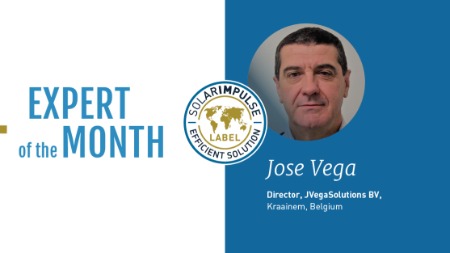Interviews - October 6, 2021
September's Expert of the Month: Dr. Nesrine Darragi!


Written by Jamie Wylie 4 min read
Each month we celebrate one of our Expert Community, a group of independent Experts from across the world from the fields of science, engineering and business. The Experts play a vital role in the Solar Impulse Foundation, using their knowledge and expertise to assess solutions seeking the Efficient Solution Label. Find out more about the Community here.
This month, we are delighted to announce that the Expert of the Month for September is Dr. Nesrine Darragi! Nesrine joined the Solar Impulse Foundation in 2020 and has assessed 14 Solutions seeking the Efficient Solution Label. Nesrine has shown real dedication to the role, assessing Solutions to a high quality and providing consistent support for the Foundation. Thank you for your amazing efforts, Nesrine!
In this interview, we find out about Nesrine's experiences in engineering, mobility, entrepreneurship and more.
Please tell us a little about yourself!
Nesrine: I am from Tunisia, and I have lived in Lille in the north of France for ten years. On the professional side, I am a researcher and an entrepreneur. I have a doctorate in industrial engineering and specialized in electric mobility. This led me to found my industrial R&D company in energy, which I currently manage. And on the private side, I am a mother of two kids and a chess player.
Can you tell us about your area of expertise and profession?
I have had a diverse academic and professional background. With a research master's degree in Computer Science and a first doctoral thesis, I was a researcher and university assistant in Cloud Computing and Artificial Intelligence. In 2011, I did a thesis in industrial engineering applied in mobility, and I spent a few years in the engineering of transport systems and powertrains. Thanks to these multidisciplinary skills, I had the opportunity in 2017 to apply my knowledge in machine learning for the design of a new battery that is more efficient and safer.
Your PhD focused on industrial engineering and e-mobility. Could you tell us about what your research focused on and what the key learnings were?
My research mainly focused on optimizing time and costs to produce critical and complex systems (such as an electric vehicle or an energy storage system, for example). In other words, I have tried to answer how to design the right system (according to a client's needs) that will work well (according to technical and regulatory specifications) in aeronautical and rail systems.
Some lessons learned that I apply in my projects are:
Force error and failure as soon as possible to eliminate the least promising leads
Spend 90% of the energy in the design and modelling phase, and 10% in the implementation phase
Use formal (mathematical) methods for the verification and validation of systems and their operations
Apply machine learning and AI to optimize behaviour, even in electrochemistry
You went on to create your own startup, Hive Electric! Could you tell us a little more about Hive Electric?
HIVE ELECTRIC is the next generation of lithium-ion and post-lithium-ion storage developer. Behind the founding of Hive, there is a desire to push the limits of energy storage systems and to offer solutions that advance the state-of-the-art in a scientifically rigorous and industrially agile manner for a quick introduction to the market. We have invented a new aluminium-ion hybrid technology that could be a sustainable and safer alternative to lithium-ion. We also have collaborations for the development of fuel cells and a hybrid powertrain.
What have been the key challenges in starting your own company, and what have been the biggest learning points?
Starting a business is like a long-distance sprint, and we must be well prepared mentally, financially, and psychologically. When we step out of our comfort zone, the first impression is doubt. We are afraid of making the wrong choices, of failing, and of disappointing. Usually, family and friends are the first blockages to deal with because they do not want to see us suffer, and they do everything they can to convince us to give up. Setting up my company on my own was not easy, and I went through the ups and downs of all entrepreneurs. I quickly had a mentor with whom I could discuss and advance in scientific and strategic thinking.
Hive Electric is a deeptech R&D startup, and seed funding for companies without a turnover is very difficult to obtain, especially that this kind of project requires several hundred thousand euros from the first day. Another challenging aspect was the fact that I am a woman and a researcher in the industrial sector. It was not encouraging for several funders, but I think the mindset is changing quickly because there are several success stories of women in science and business.
For the learning I could summarise it in three points:
There is no success without failure. I must accept it, put my ego aside and try again.
That I should never expect recognition for my work. I must do things perfectly, and the rest will come naturally.
It is important to have a real good reason to start a business. If we know exactly and deeply why we will wake up motivated at 6 am every day for years, nothing could stop us.
What are the most exciting trends you see in the field of e-mobility?
In the automotive industry, the wide-scale adoption of electric vehicles is the biggest trend that will play a crucial role in decarbonization. Mobility as a service and smart infrastructure for users, as well as 3D printing and additive manufacturing for carmakers, are also exciting and promising.
What kinds of solutions have you assessed as an Expert with the Solar Impulse Foundation? Which solutions have impressed you most, and why?
So far, I have evaluated 14 projects mainly focused on energy optimisation and GHG reduction, such as electric reactors, thermal energy storage systems, or magnetic recharging systems. Among the projects that have impressed is an solution for clean energy provided by natural hydrogen from newly discovered geological sources.
Interested in becoming an Expert with the Solar Impulse Foundation? Find out more and apply today!

Written by Jamie Wylie on October 6, 2021


